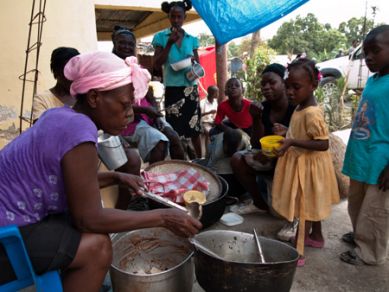Reformed Church Makes Call to Donate $1 a Day to Haiti During Lent

The Reformed Church of America (RCA) has called on its members to remember Haiti during the Lenten season, urging them to donate $1 a day during the 40 day period before Easter.
The campaign's initiator, James Seawood, president of the RCA General Synod, says he has felt compelled to help the devastated country after experiencing the effects of the Jan. 12 quake himself.
"God placed us in Haiti in the middle of the earthquake and spared our lives. Why? Only God knows. Now we must respond to the urgent appeals for help from people who are desperate. Haiti is in trouble!" Seawood said in a statement released by RCA.
"Some will say 'But I've already given,' and others, 'I've given more than once,' or 'Why Haiti?" he says. "The horrific humanitarian disaster of January 12 has already become old news, but here on the ground, my heart breaks as I see human beings begging for food, sleeping on the ground, mourning the dead, and holding on to that last sliver of dignity and a hope that God has not turned his back and that people still have compassion."
"My eyes burn and my nasal passages singe, not from sadness, but from the stench of decaying bodies, the smoke of burning trash, and the ever-present dust that reminds me of coal mines or asbestos, " Seawood continues. "There is a spirit here, however, that will not give up. People in Haiti long for a future and need a plan. We do what we can do to save lives now, knowing that our resources also must be directed towards sustained development and advocacy."
"Please join me in giving sacrificially to assist our brothers and sisters in Haiti."
The RCA is currently working with the Dominican Reformed Church (IRD) to distribute food supplies to nearly 3,000 survivors.
Meanwhile, the Inter-American Development Bank (IDB) has estimated that costs to rebuild Haiti will range between $8 billion and $14 billion, making it the most destructive natural disaster of modern times.
The estimates were made by economists at the IDB, who took into account variables such as the magnitude of the disaster, the number of fatalities, and the affected country's population, and per capita GDP.
Despite the huge amount of aid needed to rebuild Haiti's infrastructure, a forthcoming study done by IDB economist Eduardo Cavallo and others notes that countries hit by a disaster of this scale often face economic setbacks that take decades to reverse.
The study shows that even with large amounts of outside aid, the GDP of countries hit by such a disaster, even ten years later, was up to 30 percent lower than it would have been if the country had been spared.
"Of course this does not necessarily mean that aid does not work, perhaps the negative growth effect would have been even worse if aid had not increased," Cavallo's study notes. "However, this does underline the challenge ahead for Haiti and for the international community attempting to support the country."
Billions of dollars of international in aid have flowed into Haiti since the Jan. 12 tragedy devastated the Caribbean country, killing nearly 200,000.
International officials, including Canadian Prime Minister Stephen Harper, U.S. Secretary of State Hilary Clinton, and Haitian Prime Minister Jean-Max Bellerive, held a meeting in Montreal in February to discuss restoration plans for Haiti, with the group concluding that the project will probably take more than a decade.
A second meeting is scheduled to be held in New York in March.
The United Nations (U.N.), in the meantime, is scheduled to launch a revised version of its $562 million Flash Appeal for Haiti on Thursday in New York.